Success Stories
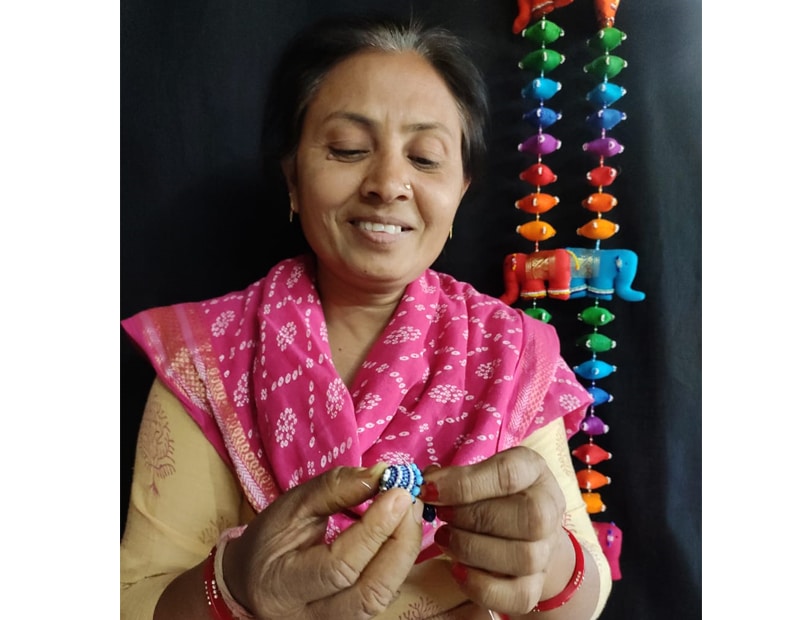
Lila ben now works in the marketing division of Sahaj. She has been associated with Sahajfor the past 12 years. “I started my training after I finished my 12th. Our family depends on agriculture and sometimes it cannot sustain us. When I attended the training, my family was doubtful about sending their daughter out to work. Since it was in our own village, they agreed to send me. Later I invited to work in the office. Imagine how scary it was for me, before that I had never come to Dahod alone”.
She has come so far from the frightened girl, now that you would never guess how she used to be back then and is proud of her accomplishments. Today, she has travelled across the country; she fills you with stories of the world she saw and experiences she lived. “I saw airplanes from so close, travelled in metro and even taught my friend to get on to an elevator. I learnt Hindi and can now fluently talk in the language. It feels so good to go places and sell our products. Sahaj opened my world and connected me to a lot of wonderful people”.
“I wear good clothes. I know things and walk with my head held high. I’m not inferior to anyone. This is what sahaj has taught me. Once we used to be so poor, we often had to borrow money. But then nobody would even lend us money, cause, after all we were tribals. But now I don’t have to dependent on anybody. I am working and earn for myself. I can support my family. I too can lead a life of dignity”, she smiles as she proudly narrates her journey from humiliation to dignity.
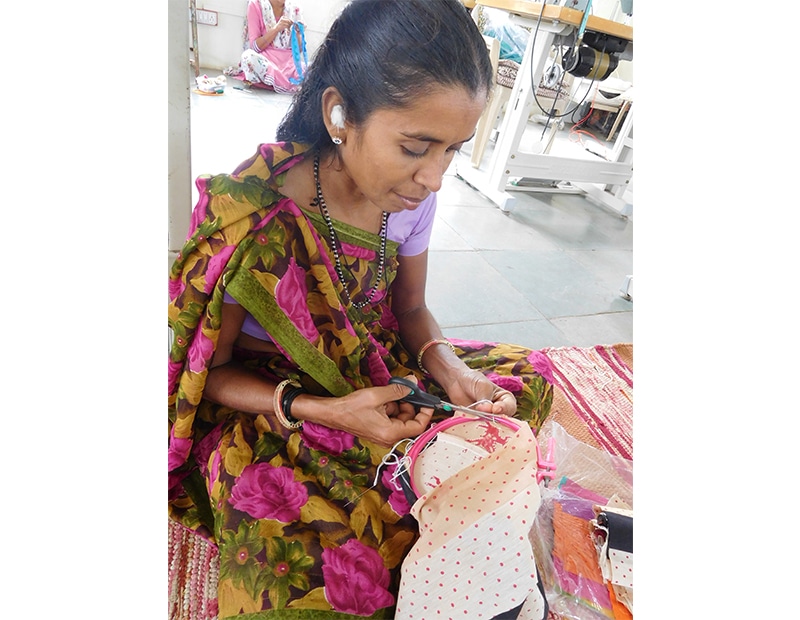
Lalita Chauhan
Until 8 years ago, Lalita and her family used to depend solely on agriculture for earning their livelihood. In addition, in lean times, they used to migrate to cities in search of wage work. That is when she came to know of Sahaj through another artisan. She initially started working from her home and now works n the Dadhela center.
“It was not easy to juggle housework and my job. I have to walk every day a long way to reach the office and there is little time for doing my household chores. However, this was something I did not want to give up at any cost. Therefore, I managed my time and made sure I could continue working. This job has given my family and me a lot. I am eating good food now, wearing sarees rather than just a skirt and blouse with a dupatta put around my body, and my whole way of life has changed. Since my husband fell ill, my family runs on my income. Now my son is also earning and supporting me. I am happy that I can support my husband and get him treatment without depending on anybody’s charity. Even if I borrow money it based on mutual trust and not pity, and that feels good. It feels good to be treated with dignity. I love working with Sahaj also for the family it has given me. I know I have sisters whom I can count on. That is a very empowering feeling”.
Manjula Bhuriya
Manjula ben has been working with Sahaj for 12 years now. Everyone in her family used to work in the agriculture fields. Now she is a trainer and also works in the production unit in Dahod. Her journey with Sahaj came with its own set of challenges. None in her family was willing to let her work and she was also scared of having to step out into a world from which she had been kept away. And now, she says, through the 12 years she has lost her fear.
“I have been to big cities like Delhi and Ahmedabad for exhibitions and I have seen what the world out there looks like. It is much more than what we could imagine. It might be scary, but we should go into it. Sitting at home, how much ever work we do nobody even counts us as proper individuals. And even we are made to believe that that is all we can be. But now I know, and this is what I tell everyone around me too, women are also capable of achieving great things”. She adds how going to the exhibitions further widened her view of the world. She excitedly talked about meeting the customers who bought her products as she managed the stall and how it was a major boost to her confidence. “You know, there are these foreigners who come to our stalls and go on and on in English. We laugh. And then we talk in gujarati and they laugh. That is how we communicated.”
With her income, she has bettered her household and ensured that her children get good education, both of whom went on to become college graduates. “I got to know about banks, how to deal with government officials and imagine, I even attend the Gram Sabha and voice my opinions there. This is something I had never thought I would be able to do in my life. Now my family and the society look at me with respect. Like I’m a person in my own and not just a wife or a mother. But Manjula”.
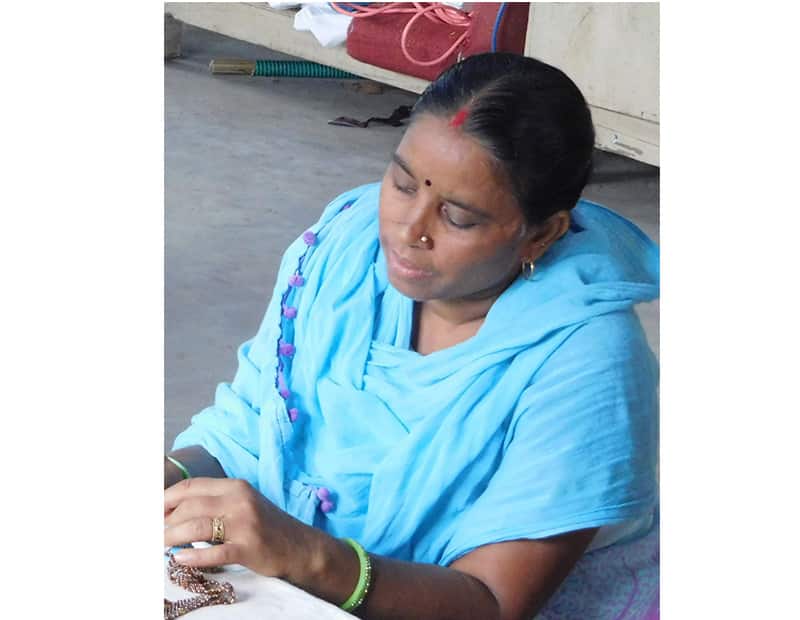
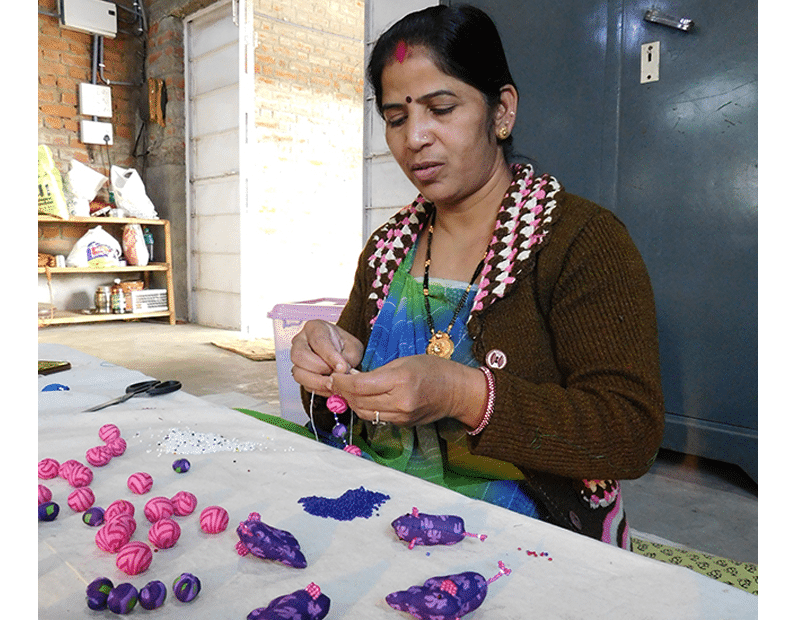
Raseela Damor
Raseela is 39 years old now. She seems visibly thrilled to be talking about her journey of 14 years with Sahaj. Three years into her marriage, she knew that if the family had to survive, there should be more income. However, her family was not quite appreciative of the idea of their daughter-in-law going out to work. Her resolve to earn for herself got strengthened as she got to know about the skill training for women in her village and that is how a journey that changed my life began, she says. Once she mastered the skill, she joined the office as a master craft worker. Easier said than done, this was not a smooth transition. She had her family to convince, children to take care of and her own fears to overcome. As Raseela puts it, “initially it was really hard, she says, I had to wake up very early and ready my kids for school, and walk all the way to Dahod. I was even scared to come to Dahod those days. Look at me now, people call me HimmatwaaliRaseela. I can talk to people”.
She has now travelled to cities like Delhi and Bhopal. She loved going around in the metro, meeting new people, and gaining exposure about the world. She is a woman who enjoys her independence and takes pride in the fact she need not depend on her husband to meet her own expenses. Her sense of belonging to her household also comes from the contribution her earning has made in buying necessary appliances and gadgets like TV and smart phones. “It feels good to have this life. You know, from with income I could help my husband buy an auto rickshaw also make changes in our cultivation practice in a way our yield has increased. This life has gained me respect in the eyes of people and also myself, it feels so beautiful”, she says. Previously nobody used to trust them enough to give them any credit. Now she get a loan for health expenses on her own name, and loves the respect she commands for being what she is. She loves spending time working in the office so much so that she loves it more than being at home. The Sahaj family is dearer to her than her own family and the emotional support she gets from the collective is what keeps her going. “Imagine what all I gained by stepping out the kitchen! I think all women should get this opportunity”, Raseela wishes.
Ramila Bamanya
Ramila has been working with Sahaj for the past 19 years. In her usual chirpy self, she seemed excited as she talked about how her zeal for learning something new pushed to join Sahaj. “Sahaj team hold a meeting in our village and asked us to join training so we can start working. I was not in the village that time. We had migrated to work. When I came back, I heard about Sahaj meeting at our village. I too felt like learning it. I join the training of 3 months. After training, I started working. Jabeen ben teach me cutting and since then I am working as cutter in Sahaj.Now she is a master cutter and assistant production in charge. “I am a trainer myself and also work in the quality control other than doing the handcraft work”. She loves that she gets to learn and impart her learning to other women.
“After joining Sahaj, I have become conscious about the value of time. I feel like now I am actually living my life, not merely passing days. I feels good when people appreciate my work. They respect me and I feel good about standing apart, making a name for myself. I am earning for myself and that is important to me. The biggest joy is that through my work I am getting to present something new and creative before the world. The best part of my day is when we write our daily work report and I write how much work I finished that day. That sense of accomplishment is worth all the hard work I have to put in to manage my housework and the job”. Ramila’s family consists of her husband and her.Her husband whose education, she proudly adds, she supported. Up to B.Ed. and M.A, Unfortunately He was not able to get the job of teacher after trying hard to get it. He was in depression, Ramila support him and bring him back to normal life. Now he is also working in Dahod. However, here is more to what she loves about working.“The work atmosphere at Sahaj is so nice”, she goes on.. Here, we are a family. We care for each other. And that makes this work so much more important for us”.
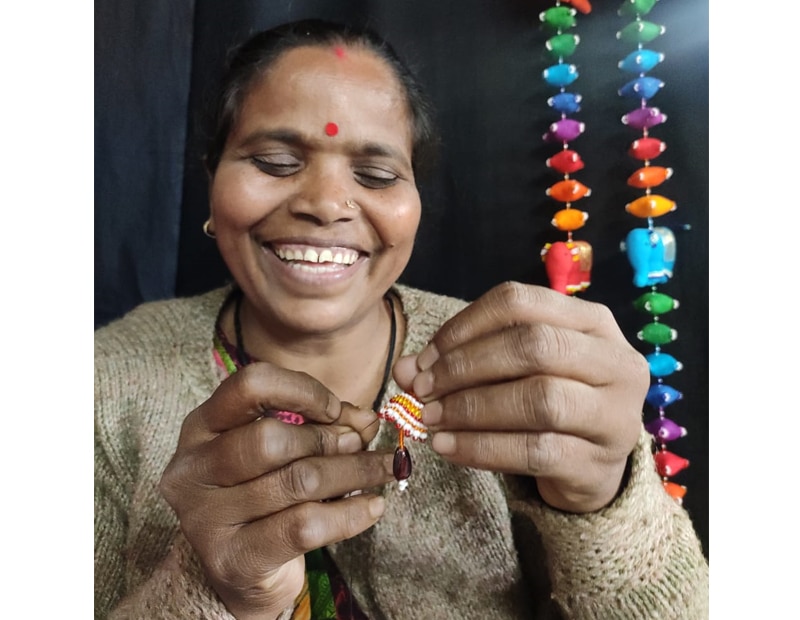
Bharti Mavi
Bharti ben smiles as she asked about her journey with Sahaj. 34 years old now, Bharti grew up watching her mother doing handicraft work from home. Once she was done with schooling came to Sahaj office with her mother. “That time we didn’t have any aspirations. Schooling was just a formality. Thenthere was nothing I had thought I would do. My younger siblings were still in school and my mother’s income was supporting our education. So I thought I would lessen my mother’s burden by working”.
Once she started working, however, there was no looking back. Even when she was getting married, she made sure her marital family would let her continue working. “There were a lot of instances when I had to really struggle to hold on to the job. I did not want to stay at home. I just had realized that I could dream of a better life too. And this job was letting me move closer to fulfilling them. This was my chance at providing a better life to my child. So I kept coming back to work however difficult it got to convince my family”.
“I have no big degrees, I hail from a very poor tribal family but I know I am capable. If given right opportunities everyone will be able to achieve great things in life. It is never true that we cannot accomplish anything because of our backgrounds. It is about getting a platform”. Through the years she worked with Sahaj, she has travelled to places, and has the experience of working as an artisan, has worked in the quality control division, conducted trainings, is in charge of field visits and monitoring SHGs and manages the production wing in Dahod.
These experiences have not only changed how the world sees her, but how she sees herself. “I learnt how to interact with different people, how to present myself respectably, I learnt about many government schemes, about banking, about new avenues and opportunities for my children and moreover I realized that I could be a role model too. I began to sense the respect with which people approached me. They now look upto me and feel encouraged to aspire for a better life, and that is a beautiful feeling. Sahaj has taught me to dream. And that changed my life”. Bharti was the recipient of the SthreeUdyamitaSamman award instituted by Gandhi SmritiDarshanSamiti in 2015. The award recognized her contribution at the grassroots level for capacity building and helping SHGs of tribal women.
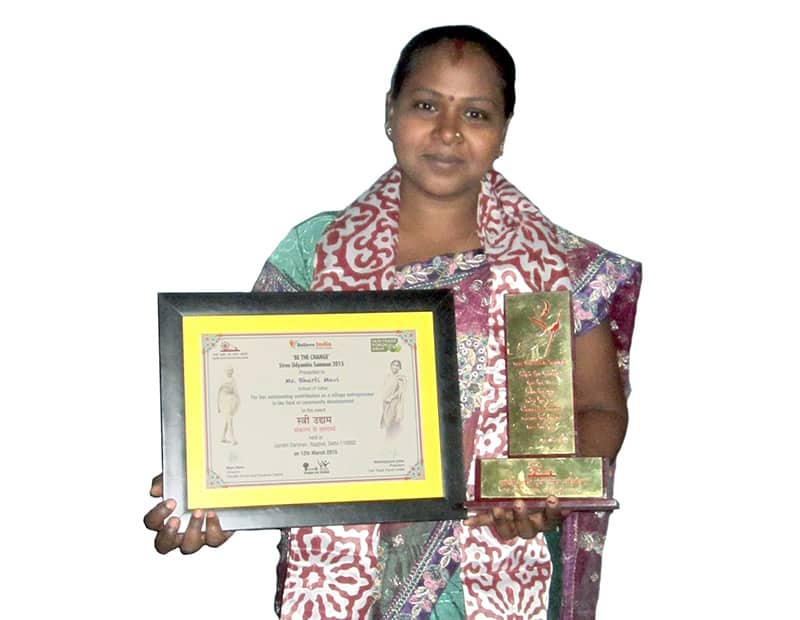
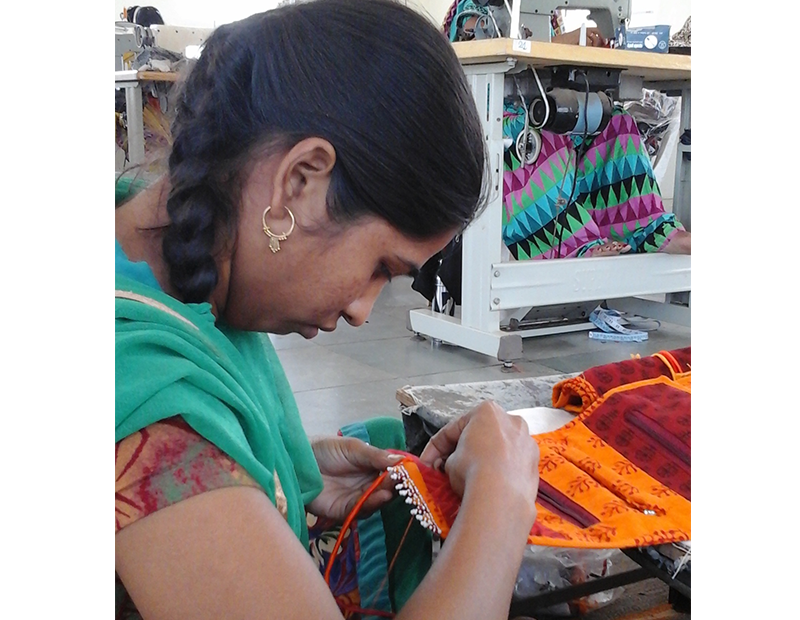
Mira Rathod
Mira is 24 years old and says that she owes her independence to Sahaj. She started working with Sahaj 4 years back. After completing her 12th standard, Mira like every other girl thought that she would have to now sit at home and wait to get married, and spend her lifetime in the field and household. Instead, she wished she would be able to do something of her own. The desire of hers fulfilled as her aunt who works with Sahaj asked her to join the skill training camp. After two months of training, still excited about having got to learn something new, she started working from home. Later as her expertise showed in her work and due her enthusiasm to learn more, she called to work from the office. She is also a trainer and loves training other women for the organization. She gone to different places around the state to conduct training sessions and is proud of the same.
“I love the fact that the fear in me has gone for good now. I can travel even alone now. You cannot even imagine how scared I was to get out of my house alone. I was so worried about how the world would treat me”, Mira says. She now contributes to the family income otherwise dependent on agriculture and takes care of her own expenses. She beams as she says she is also able to support her younger sibling now with her earning. The sense of dignity this confers to the young woman reflects in her eyes as she speaks. She is no longer scared of venturing out of her home, and is joyous about being able to groom herself according to the modern world. “That is another thing that changed. I came here and saw the kind of clothing that people wear. I realized that I could also dress up and present myself in a way that made me feel good about myself. I like this feeling of being looked at with respect and not dismissal”. She loves design work and aspires to learn more skills and carve out for herself a better life.
Shakuntla Parmar
Associated with Sahaj for the past 15 years, Shakuntla currently works in the Dahod office administration. Although she had a master’s degree in Gujarati, like all women, she says, she did not have an option but stay at home. That was when she heard about Sahaj and undertook the training. Since she was the leader of their SHG, she kept coming down to Dahod office and later started working in the production unit in Dahod. “Though it was difficult to convince elders in the family to let me travel to different places on my own and sometimes return late or the next day. But I knew I had to as I did not want to give up doing something I really loved”.
She used to go on field visits, convene meetings with different SHGs and also designed and conducted training sessions for the artisans. She also conducted computer training under the digital empowerment project. “It was so good. I knew basics of computer and then I took a training myself. Then I came back and taught people how about computers and how to use it”.
“I am proud that I can support my family and my earning has helped me improve our household. Every time I enter my house, which previously used to be kaccha and which with my income I made pukka, I feel this sense of accomplishment. Like, I am doing something with my life. Something so very tangible. It makes me so happy. I used to be very shy and not talk at all initially. Now I am professionally equipped to communicate and can present myself well to the world. I think whatever a person does in life at the end, it should make them happy, and else it is all pointless. And I can say I am happy”.
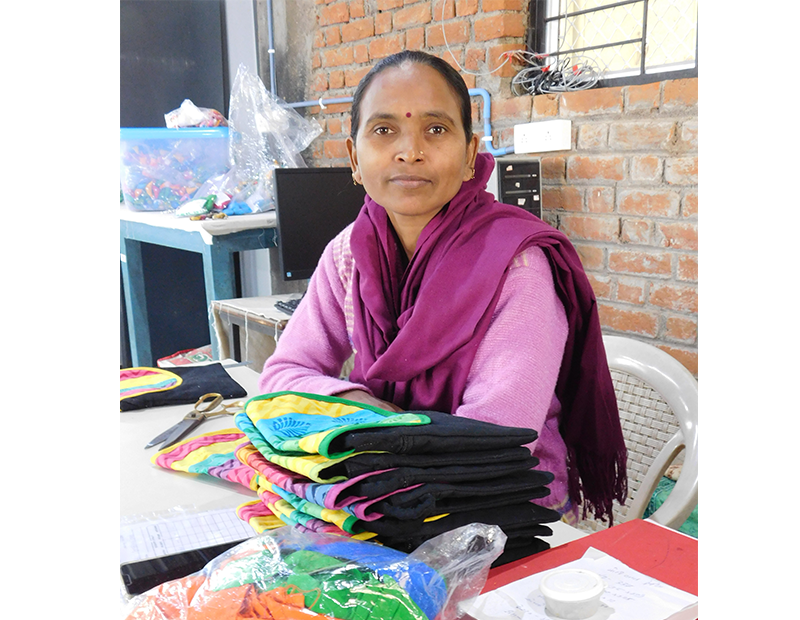

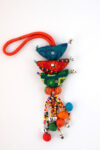 SAHAJ India Keychain Bird...
SAHAJ India Keychain Bird...  Sahaj Classic Series Drap...
Sahaj Classic Series Drap... 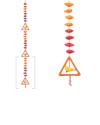 Sahaj multicolors Trigang...
Sahaj multicolors Trigang... 